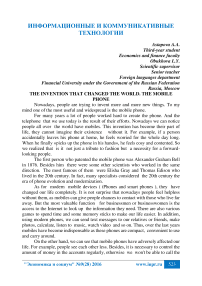The invention that changed the world. The mobile phone
Автор: Astapova A.A.
Журнал: Экономика и социум @ekonomika-socium
Рубрика: Информационные и коммуникативные технологии
Статья в выпуске: 9 (28), 2016 года.
Бесплатный доступ
Короткий адрес: https://sciup.org/140121450
IDR: 140121450
Текст статьи The invention that changed the world. The mobile phone
Nowadays, people are trying to invent more and more new things. To my mind one of the most useful and widespread is the mobile phone.
For many years a lot of people worked hard to create the phone. And the telephone that we use today is the result of their efforts. Nowadays we can notice people all over the world have mobiles. This invention has become their part of life, they cannot imagine their existence without it. For example, if a person accidentally leaves his phone at home, he feels worried for the whole day long. When he finally «picks up the phone in his hands», he feels cosy and contented. So we realized that is it not just a tribute to fashion but a necessity for a forwardlooking people.
The first person who patented the mobile phone was Alexander Graham Bell in 1876. Besides him there were some other scientists who worked in the same direction. The most famous of them were Elisha Gray and Thomas Edison who lived in the 20th century. In fact, many specialists considered the 20th century the era of phone evolution and modernization.
As for modern mobile devices ( iPhones and smart phones ), they have changed our life completely. It is not surprise that nowadays people feel helpless without them, as mobiles can give people chances to contact with those who live far away. But the most valuable function for businessmen or businesswomen is the access to the Internet to look up the information they need. There are also various games to spend time and some memory sticks to make our life easier. In addition, using modern phones, we can send text messages to our relatives or friends, make photos, calculate, listen to music, watch video and so on. Thus, over the last years mobiles have become indispensable as these phones are compact, convenient to use and carry around.
On the other hand, we can see that mobile phones have adversely affected our life. For example, people see each other less. Besides, it is necessary to control the amount of money in the accounts regularly, otherwise we won't be able to call the person we need at the most inapt moment. But the main drawback of mobile phones is their harmful influence on people’s health. Doctors say that these devices do not only affect our eye-sight, but the immune system as well. That is why many of us fall ill constantly. The radiation received from mobile phones is also very harmful. Moreover, these gadgets replace personal contact statistically. It is common knowledge that people meet each other more seldom. Although they can be hazardous to our health we cannot live without these devices . And in spite of their harm we tend to use them more and more widely.
This excessive usage is due to mobile learning which is gaining popularity. As iPhones and smart phones are becoming more common and low-priced. Thus modern technology can significantly improve the quality of education and bring digital content to students. Therefore it is not surprising that young people use mobile devices to make education more attractive and personalize it for their specific needs.
The technology-rich activities can support high level of students’ participation and collaboration in educational process. Teachers need to know how to use mobile platform for educational purposes and use it to improve learning. An access to the tablet is a necessary component of the educational process today as m-learning makes it possible for us to work and study in any place and any time .
Now we need a new generation of specialists and entrepreneurs. So the main purpose of the government is to train the workforce which is efficient , adaptive and competitive in a global context as jobs and roles are evolving.
Список литературы The invention that changed the world. The mobile phone
- www.brookings.edu/research/mobile-learning-transfo...-improving-outcomes/


